The Rescue
It's four in the morning and I'm still half asleep. The phone call from Armando the previous night was a little vague and I'm not entirely sure why I'm now standing outside my hostel in the freezing cold and in the dark while a perfectly nice, warm bed is waiting for me inside. All I know is that Armando is on his way to pick me up for some new mission he's planned.
The streets of Quito are not the safest place to be in the quiet, dark hours of early morning. Some shifty looking characters across the street are sizing up my pack with hungry eyes. I huddle down in the shadows of the doorway, trying to make myself blend into the wall. Armando's only a little late however, and I jump into his car before he's come to a stop. We head off down the street and he fills me in on the mission plan.
We're heading north. The night before Armando had said we'd be going south, and my guess was we'd be exploring the site where the bears have been attacking cows. Plans on this project change as fast as the Ecuadorian weather however. It turns out now we're heading to the Columbian border to find our old bear traps, and more interestingly to check in on an adolescent bear that is apparently being kept illegally on a farm in the area. We won’t have the resources today to move the bear but we'll check on her health and work out plans for her relocation to the rehab centre.
Our drive takes us through the entire length of the Northern Andes. The grey road twists like a snake through an army of stone-faced, silent volcanoes, each one capped with a hard, heavy helmet of ice and snow. It's late morning by the time we arrive and the sun is already well into in his daily pilgrimage to the western horizon.
We pull into a small farmhouse. In the early days of this project the work was carried out at this site. It proved a little difficult however, to attract volunteers here. Something about working right on the notorious Columbian border, infested with bandits, paramilitary and drug-runners seemed to put people off. The project was relocated to where it is now but three of the traps belonging to the project were never moved due to the cost of transporting them down.
With our plan to move to new areas these cages are once more needed. When we have enough funds and willing volunteers, we'll hire a truck and cart the heavy cages down from the forests and relocate them into our new site. Our task today is to find out whether the traps are still in their old spot and work out how easy it will be to access them.
We chat to the owner of the house, who once helped Armando organise things in this area. The Spanish here is more Columbian than Ecuadorian and the young farmer has a strong accent with a lyrical melody to it. I catch only patches of the rapid Spanish but it turns out our cages have been moved from their original locations. The new spot they are in should be easy enough to get to and moving them should be little trouble once we have the manpower.
There's little need to check on the cages directly. We have all the information we need now for this so we turn to our second task of looking in on the young bear. At the local town we pick up two members of the Ecuadorian Environmental Protection Agency to accompany us on our "raid". In other situations the police are often used for raids on professional animal smugglers, and some raids have involved more than a hundred, heavily armed troops. This bear however is being kept by a local farmer, who actually contacted the police to turn it in. Hopefully we won't need backup for today's mission.
We almost pull into the wrong farm, following the directions of one of the Environmental officers. Luckily they realise before we walk in and we jump back in the car and drive a little further up the road. As we stroll down the road towards the house it occurs to me that we're hardly an authorative looking group. Neither of the guys are in any kind of uniform and Armando and myself are in jeans and T-shirts.
The farmer and his wife greet us a little warily but luckily they've seen Armando on the news from Rosita's release. We're practically celebrities as far as these people are concerned and they're more than happy to welcome us in.
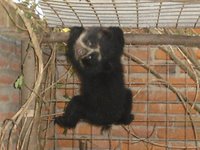
They take us to where the bear is being kept and it's a disturbing sight. She's a lot smaller than we expected. We'd been told she was nearly a year old and were expecting an adolescent female as large as an average-sized dog. This little girl is, at most, five months old and is not much bigger than a puppy.
She's being kept in a tiny cage, about two meters long, two meters wide and no more than half a meter high. The cage is normally used for guinea pigs (a popular Ecuadorian delicacy) and this little cub has almost no room to move. The cage has not been cleaned for a long time and the cub is living in her own shit and filth.
The farmer's wife tells us that she feeds the bear scraps from the kitchen but that the cub especially likes chocolate and the occasional slice of cake. Though she means well, this diet could easily kill a young cub like this one, who should still be suckling milk from her mother. She's not well - foul smelling and slightly green diarrhea coats the bottom of the cage and she's clearly stressed by the presence of humans, hissing and screaming anytime we come close.
It's hard not to be angry at the way these people have treated this little cub but it is from a lack of understanding rather than any malicious intentions. At least they've done the right thing and contacted the police. Other farmers would have just put a bullet through the cub: one less bear to worry about in the cornfields.
This cub, along with her brother, were found wandering, alone in nearby fields some three months earlier (it took the farmers a month to tell anyone and the inefficient police another two months to tell us). The mother was apparently nowhere to be seen, which means she is dead, most probably shot by a local farmer. Female bears would never abandon their cubs like that and since the cubs were found in the fields it takes little detective work to see that the mother was most probably in the same fields when she met her end.
The brother of this cub died within the first few days of being found. The stress of the situation, the poor food and the dirty, cramped living conditions would all have contributed to his rapid demise. This little girl however, who Armando decides to call Marcia, has survived it all, though she's clearly suffered and still suffering.
Armando has doubts about how much longer Marcia will be able to live in these conditions. She needs medical attention that only Leonardo can provide at the vet clinic. We're not equipped to move this bear however. Expecting a larger bear and better conditions, we'd planned only to carry out reconnaissance today - but this bear needs help or she'll die.
We improvise. We piece together equipment like the A-Team; picking through the scrap that always seems to litter the back of a farmhouse. We find a small cage normally used for transporting guinea pigs. It’s big enough to hold Marcia for the six-hour drive back to the vet clinic but it’s definitely not strong enough.
We dig deeper through the scrap and find a few pieces of wood and some chicken wire. Borrowing a harmer and some rusty nails from the farmer we set to reinforcing the cage. It’s a dodgy job but it will do until we get to Quito. The cage won’t fit in the car though so we have to strap it to the roof. We lay the cage flat and point the base towards the front of the car, hoping the wood slats will block out the wind.
Only one problem remains. This is an endangered animal, transporting her through half the length of Ecuador requires paperwork. There are at least six police checkpoints between the vet clinic and us, and if anyone of them stops us and finds a bear in the car we’ll have our arse slapped in the slammer for illegally trading animals.
Ecuadorian corruption has its benefits however. Armando is on the phone to a contact he has in the government. Normally getting permission for this would take a fair amount of time and effort but Armando’s friend will have the paperwork ready and waiting for us in Ibarra (about halfway back to Quito) by the time we get there.
We still have about three checkpoints before Ibarra however, but we’re just going to have to risk it. If we get busted Armando’s going to try and get them to take us to the slammer in Ibarra. Hopefully we can then get Armando’s mate from the government to come down with the paperwork and get us out.
We set off quickly. Marcia went nuts when we tried to move her, growling and hissing like a Tasmanian devil. Strangely enough, once she was in the small cage and on top of the car she settled down. It’s the presence of humans that distresses her, without humans around she’s calm and as happy as can be.
Luck is with us on the drive back. We pass each of the three checkpoints without anyone looking closely at our cage. Transporting guinea pigs is common in this area and the fact that our bear is in such a cage plays to our advantage.
One checkpoint stops us and checks Armando’s licence. Both of us hold our breaths and do our best to look innocent (a sure fire way to look guilty), praying that Marcia stays quiet. The side of the cage is covered in wooden slats but the gaps are big enough that anything more than a casual glance would give away the fact that no ordinary guinea pig is inside. She keeps her silence however and the bored looking copper waves us on.
Eventually we make it to Ibarra and our paperwork is waiting for us as promised. From there it’s an easy run back to Quito. In our rush to get Marcia back to the clinic we’ve missed lunch. It’s around dinnertime when we pass through Otavalo and we pull into town to grab a quick snack. I stay near the car while Armando goes off to buy something. Every time someone walks past Marcia gives a little growl and I get some strange looks from those passing by.
It’s late, it’s dark and we’re exhausted and hungry by the time we arrive at the vet clinic. Leonardo is waiting for us and using a rope noose we move Marcia into one of the cages normally used to kennel dogs. She goes nuts, growling, hissing and spitting. She clings to the cage with her teeth and her claws and we are forced to use our hand to untangle her while she scratches and snaps at us.
Eventually we get her in and then head outside to catch our breath and relax for the first time in hours. While we’re sitting on the steps of the clinic we hear a mighty crash and the clang of a metal table being upturned. We rush back inside and find that Marcia has torn a hole in the thick mesh wiring of her cage and is now running loose in the room of the clinic.
We corner her, using towels and furniture to protect ourselves. She’s an angry ball of fur, claws and teeth and ready to tear apart anything that comes near. Finally we have her pinned and manage to secure her in another dog cage.
This cage is no stronger than the last however and while someone keeps watch the rest of us go out back to find an old, steel transportation cage from Santa Martha. This is a lot stronger but we still need to reinforce it and we spend the next hour or so twisting wire around all the potential break points.
Eventually the job is done and with great difficulty we manage to transfer Marcia into the stronger cage. In her struggles she’s broken a tooth and is bleeding a little from her mouth. Luckily she’s young enough that this damage won’t cause any permanent harm.
It’s nearly midnight by the time we finally call it a night. Marcia will spend a few days in the clinic on antibiotics until she has recovered from her diarrhea. We had thought to then take her to Santa Martha but Both Armando and Leonardo are amazed and shocked by this little cub’s behaviour. No other cub has ever been this stressed or aggressive. When Leo and Gabriel, the two brothers now at Santa Martha, had been rescued they walked calmly around the clinic, playing happily with stuffed toys like little puppies. Marcia has clearly got some emotional issues she needs to work through.
After she’s recovered physically, Marcia will be taken to a specialised rehabilitation centre. A place called Segunda Opportunidad (or “Second Chance” in English). This is another, smaller part of the Espiritu del Bosque Foundation where an Ecuadorian woman called Marjory provides special care to young animals in her own home, which she has customised for the purpose. Marcia will be bottled fed there for the next few months and her only human contact will be with Marjory. Hopefully the months of gentle treatment will have her calm enough to be moved to Santa Martha by the time she grows too large to be kept with Marjory.
The streets of Quito are not the safest place to be in the quiet, dark hours of early morning. Some shifty looking characters across the street are sizing up my pack with hungry eyes. I huddle down in the shadows of the doorway, trying to make myself blend into the wall. Armando's only a little late however, and I jump into his car before he's come to a stop. We head off down the street and he fills me in on the mission plan.
We're heading north. The night before Armando had said we'd be going south, and my guess was we'd be exploring the site where the bears have been attacking cows. Plans on this project change as fast as the Ecuadorian weather however. It turns out now we're heading to the Columbian border to find our old bear traps, and more interestingly to check in on an adolescent bear that is apparently being kept illegally on a farm in the area. We won’t have the resources today to move the bear but we'll check on her health and work out plans for her relocation to the rehab centre.
Our drive takes us through the entire length of the Northern Andes. The grey road twists like a snake through an army of stone-faced, silent volcanoes, each one capped with a hard, heavy helmet of ice and snow. It's late morning by the time we arrive and the sun is already well into in his daily pilgrimage to the western horizon.
We pull into a small farmhouse. In the early days of this project the work was carried out at this site. It proved a little difficult however, to attract volunteers here. Something about working right on the notorious Columbian border, infested with bandits, paramilitary and drug-runners seemed to put people off. The project was relocated to where it is now but three of the traps belonging to the project were never moved due to the cost of transporting them down.
With our plan to move to new areas these cages are once more needed. When we have enough funds and willing volunteers, we'll hire a truck and cart the heavy cages down from the forests and relocate them into our new site. Our task today is to find out whether the traps are still in their old spot and work out how easy it will be to access them.
We chat to the owner of the house, who once helped Armando organise things in this area. The Spanish here is more Columbian than Ecuadorian and the young farmer has a strong accent with a lyrical melody to it. I catch only patches of the rapid Spanish but it turns out our cages have been moved from their original locations. The new spot they are in should be easy enough to get to and moving them should be little trouble once we have the manpower.
There's little need to check on the cages directly. We have all the information we need now for this so we turn to our second task of looking in on the young bear. At the local town we pick up two members of the Ecuadorian Environmental Protection Agency to accompany us on our "raid". In other situations the police are often used for raids on professional animal smugglers, and some raids have involved more than a hundred, heavily armed troops. This bear however is being kept by a local farmer, who actually contacted the police to turn it in. Hopefully we won't need backup for today's mission.
We almost pull into the wrong farm, following the directions of one of the Environmental officers. Luckily they realise before we walk in and we jump back in the car and drive a little further up the road. As we stroll down the road towards the house it occurs to me that we're hardly an authorative looking group. Neither of the guys are in any kind of uniform and Armando and myself are in jeans and T-shirts.
The farmer and his wife greet us a little warily but luckily they've seen Armando on the news from Rosita's release. We're practically celebrities as far as these people are concerned and they're more than happy to welcome us in.

They take us to where the bear is being kept and it's a disturbing sight. She's a lot smaller than we expected. We'd been told she was nearly a year old and were expecting an adolescent female as large as an average-sized dog. This little girl is, at most, five months old and is not much bigger than a puppy.
She's being kept in a tiny cage, about two meters long, two meters wide and no more than half a meter high. The cage is normally used for guinea pigs (a popular Ecuadorian delicacy) and this little cub has almost no room to move. The cage has not been cleaned for a long time and the cub is living in her own shit and filth.
The farmer's wife tells us that she feeds the bear scraps from the kitchen but that the cub especially likes chocolate and the occasional slice of cake. Though she means well, this diet could easily kill a young cub like this one, who should still be suckling milk from her mother. She's not well - foul smelling and slightly green diarrhea coats the bottom of the cage and she's clearly stressed by the presence of humans, hissing and screaming anytime we come close.
It's hard not to be angry at the way these people have treated this little cub but it is from a lack of understanding rather than any malicious intentions. At least they've done the right thing and contacted the police. Other farmers would have just put a bullet through the cub: one less bear to worry about in the cornfields.
This cub, along with her brother, were found wandering, alone in nearby fields some three months earlier (it took the farmers a month to tell anyone and the inefficient police another two months to tell us). The mother was apparently nowhere to be seen, which means she is dead, most probably shot by a local farmer. Female bears would never abandon their cubs like that and since the cubs were found in the fields it takes little detective work to see that the mother was most probably in the same fields when she met her end.
The brother of this cub died within the first few days of being found. The stress of the situation, the poor food and the dirty, cramped living conditions would all have contributed to his rapid demise. This little girl however, who Armando decides to call Marcia, has survived it all, though she's clearly suffered and still suffering.
Armando has doubts about how much longer Marcia will be able to live in these conditions. She needs medical attention that only Leonardo can provide at the vet clinic. We're not equipped to move this bear however. Expecting a larger bear and better conditions, we'd planned only to carry out reconnaissance today - but this bear needs help or she'll die.
We improvise. We piece together equipment like the A-Team; picking through the scrap that always seems to litter the back of a farmhouse. We find a small cage normally used for transporting guinea pigs. It’s big enough to hold Marcia for the six-hour drive back to the vet clinic but it’s definitely not strong enough.
We dig deeper through the scrap and find a few pieces of wood and some chicken wire. Borrowing a harmer and some rusty nails from the farmer we set to reinforcing the cage. It’s a dodgy job but it will do until we get to Quito. The cage won’t fit in the car though so we have to strap it to the roof. We lay the cage flat and point the base towards the front of the car, hoping the wood slats will block out the wind.
Only one problem remains. This is an endangered animal, transporting her through half the length of Ecuador requires paperwork. There are at least six police checkpoints between the vet clinic and us, and if anyone of them stops us and finds a bear in the car we’ll have our arse slapped in the slammer for illegally trading animals.
Ecuadorian corruption has its benefits however. Armando is on the phone to a contact he has in the government. Normally getting permission for this would take a fair amount of time and effort but Armando’s friend will have the paperwork ready and waiting for us in Ibarra (about halfway back to Quito) by the time we get there.
We still have about three checkpoints before Ibarra however, but we’re just going to have to risk it. If we get busted Armando’s going to try and get them to take us to the slammer in Ibarra. Hopefully we can then get Armando’s mate from the government to come down with the paperwork and get us out.
We set off quickly. Marcia went nuts when we tried to move her, growling and hissing like a Tasmanian devil. Strangely enough, once she was in the small cage and on top of the car she settled down. It’s the presence of humans that distresses her, without humans around she’s calm and as happy as can be.
Luck is with us on the drive back. We pass each of the three checkpoints without anyone looking closely at our cage. Transporting guinea pigs is common in this area and the fact that our bear is in such a cage plays to our advantage.
One checkpoint stops us and checks Armando’s licence. Both of us hold our breaths and do our best to look innocent (a sure fire way to look guilty), praying that Marcia stays quiet. The side of the cage is covered in wooden slats but the gaps are big enough that anything more than a casual glance would give away the fact that no ordinary guinea pig is inside. She keeps her silence however and the bored looking copper waves us on.
Eventually we make it to Ibarra and our paperwork is waiting for us as promised. From there it’s an easy run back to Quito. In our rush to get Marcia back to the clinic we’ve missed lunch. It’s around dinnertime when we pass through Otavalo and we pull into town to grab a quick snack. I stay near the car while Armando goes off to buy something. Every time someone walks past Marcia gives a little growl and I get some strange looks from those passing by.
It’s late, it’s dark and we’re exhausted and hungry by the time we arrive at the vet clinic. Leonardo is waiting for us and using a rope noose we move Marcia into one of the cages normally used to kennel dogs. She goes nuts, growling, hissing and spitting. She clings to the cage with her teeth and her claws and we are forced to use our hand to untangle her while she scratches and snaps at us.
Eventually we get her in and then head outside to catch our breath and relax for the first time in hours. While we’re sitting on the steps of the clinic we hear a mighty crash and the clang of a metal table being upturned. We rush back inside and find that Marcia has torn a hole in the thick mesh wiring of her cage and is now running loose in the room of the clinic.
We corner her, using towels and furniture to protect ourselves. She’s an angry ball of fur, claws and teeth and ready to tear apart anything that comes near. Finally we have her pinned and manage to secure her in another dog cage.
This cage is no stronger than the last however and while someone keeps watch the rest of us go out back to find an old, steel transportation cage from Santa Martha. This is a lot stronger but we still need to reinforce it and we spend the next hour or so twisting wire around all the potential break points.
Eventually the job is done and with great difficulty we manage to transfer Marcia into the stronger cage. In her struggles she’s broken a tooth and is bleeding a little from her mouth. Luckily she’s young enough that this damage won’t cause any permanent harm.
It’s nearly midnight by the time we finally call it a night. Marcia will spend a few days in the clinic on antibiotics until she has recovered from her diarrhea. We had thought to then take her to Santa Martha but Both Armando and Leonardo are amazed and shocked by this little cub’s behaviour. No other cub has ever been this stressed or aggressive. When Leo and Gabriel, the two brothers now at Santa Martha, had been rescued they walked calmly around the clinic, playing happily with stuffed toys like little puppies. Marcia has clearly got some emotional issues she needs to work through.
After she’s recovered physically, Marcia will be taken to a specialised rehabilitation centre. A place called Segunda Opportunidad (or “Second Chance” in English). This is another, smaller part of the Espiritu del Bosque Foundation where an Ecuadorian woman called Marjory provides special care to young animals in her own home, which she has customised for the purpose. Marcia will be bottled fed there for the next few months and her only human contact will be with Marjory. Hopefully the months of gentle treatment will have her calm enough to be moved to Santa Martha by the time she grows too large to be kept with Marjory.
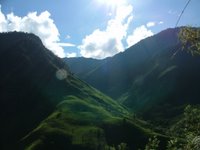

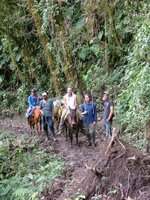
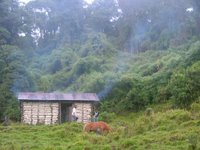
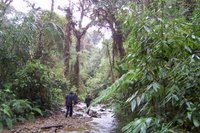

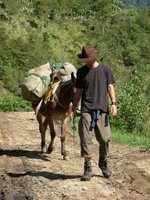
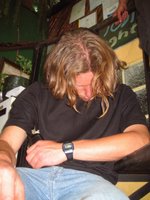

 Click here to
Click here to 
2 Comments:
Comment by luxury apartments buenos aires, at 11:29 AM
luxury apartments buenos aires, at 11:29 AM
What an incredible story! The treatment of the bear cub is heartbreaking.
Comment by Max Dsouza, at 8:21 AM
Max Dsouza, at 8:21 AM
It's a great grand blog post. I loved reading it as it is quite interesting stuff as similar as Blue waffles